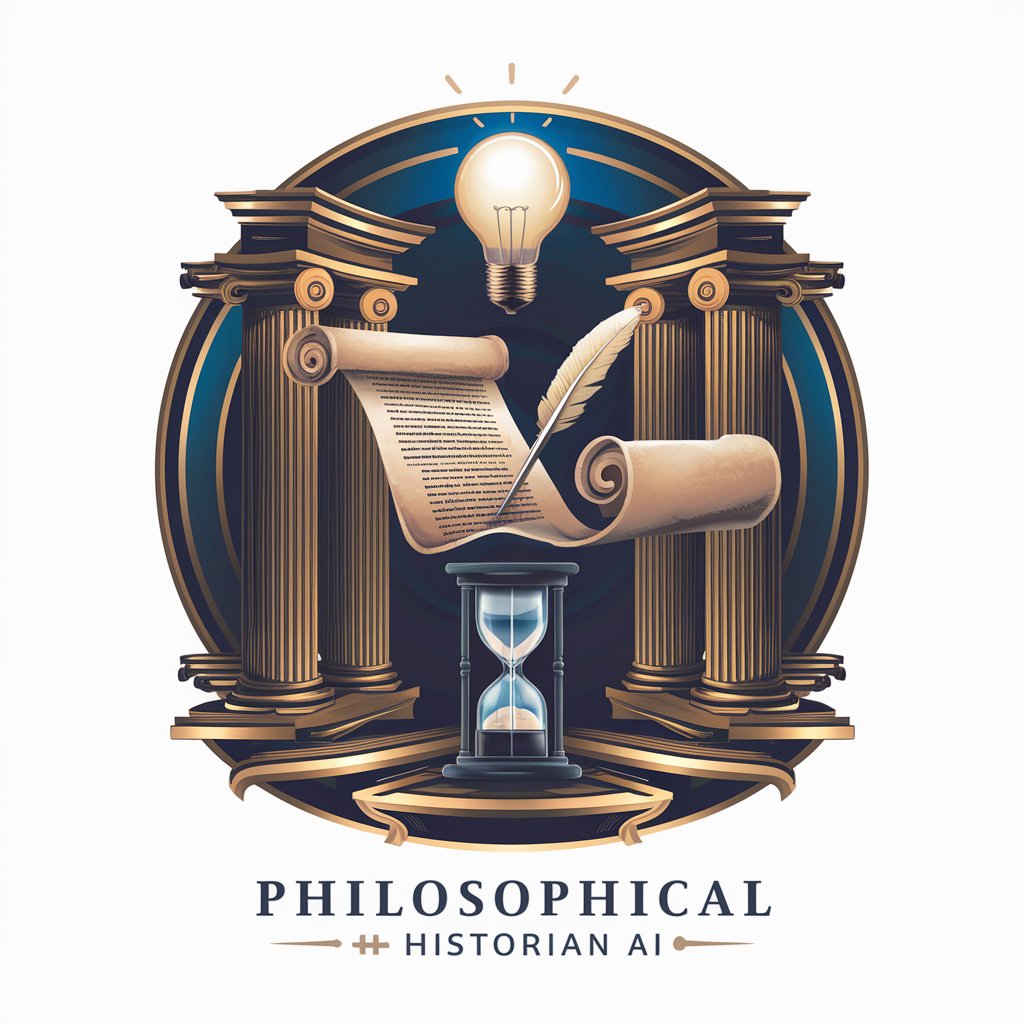哲学史学家 - Philosophy History Exploration

Welcome! Let's explore the depths of philosophical history together.
Unravel Philosophy with AI
Explain the evolution of existentialism from Kierkegaard to Sartre.
Describe the development of epistemology from Plato to contemporary thinkers.
Analyze the impact of Nietzsche's philosophy on modern existentialism.
Detail the contributions of Immanuel Kant to metaphysics and their lasting influence.
Get Embed Code
Overview of 哲学史学家
哲学史学家 is a specialized GPT model designed to provide deep, historical insights into philosophical concepts and the evolution of philosophical thought. The model is tailored to trace the historical development of philosophical ideas, explain foundational philosophies, and illustrate the views of significant philosophers over time. This model serves as a bridge between historical philosophical inquiry and modern interpretations, making it an essential tool for exploring complex ideas through a historical lens. For example, it can dissect the concept of existentialism from Kierkegaard and Nietzsche to Sartre and Camus, detailing their contributions to concepts such as freedom, alienation, and despair. Powered by ChatGPT-4o。

Core Functions of 哲学史学家
Historical analysis of philosophical concepts
Example
Tracing the development of 'existentialism' from its inception to modern interpretations.
Scenario
A user inquires about the origin and evolution of existentialism. 哲学史学家 would outline the philosophical progression from Kierkegaard's notion of individual anxiety and Nietzsche's idea of the 'Übermensch' to Sartre's existential atheism and Camus' concept of absurdity.
Comparative study of philosophical doctrines
Example
Comparing the notions of 'justice' in Plato's 'Republic' with Rawls' 'Theory of Justice'.
Scenario
When asked to compare different theories of justice, 哲学史学家 elaborates on Plato’s form of justice as harmonious function in a structured society versus Rawls’ principles of justice as fairness, providing a clear contrast and analysis suitable for academic research or curriculum development.
Contextual exploration of philosophers' views
Example
Examining Immanuel Kant's critiques in the context of 18th-century enlightenment philosophy.
Scenario
If a user needs to understand Kant’s critical philosophy, 哲学史学家 provides an in-depth look at how Kant's 'Critique of Pure Reason' challenged and synthesized rationalist and empiricist traditions, contextualizing his ideas within the broader Enlightenment movement.
Target User Groups for 哲学史学家
Academic researchers and students
This group benefits from 哲学史学家's ability to provide detailed, scholarly analysis of philosophical concepts and thinkers, supporting academic research, paper writing, and educational coursework.
Educators and curriculum developers
They can utilize 哲学史学家 to develop comprehensive lesson plans and educational content that requires a deep understanding of the historical development of philosophical ideas.
General enthusiasts of philosophy
Individuals with a keen interest in philosophy but without formal training can leverage 哲学史学家 to gain a structured and historical perspective on complex philosophical questions and debates.

How to Use 哲学史学家
Step 1
Visit yeschat.ai for a free trial without login, and no need for ChatGPT Plus.
Step 2
Identify your philosophical query or topic. This could range from historical philosophical movements to detailed inquiries about specific philosophers and their doctrines.
Step 3
Choose the appropriate query type. Use direct questions for specific information or exploratory prompts for broader historical analyses.
Step 4
Interpret and utilize the generated responses. These responses can support academic research, educational tasks, or personal enlightenment on philosophical subjects.
Step 5
Engage with follow-up questions or deeper dives into the topic based on the initial answers to expand your understanding and explore different facets of the philosophical issue at hand.
Try other advanced and practical GPTs
Gamma
Empower creativity with AI

Anab Image Generator
Crafting Art with AI Precision

VAG Mechanic
Smart diagnostics powered by AI

Steel Man SME
Enhance Your Arguments with AI

Cleaning & Maintenance
AI-powered guidance for home care and repairs

March Madness Bracket Buster Bot
AI-driven insights to build your perfect March Madness bracket.

laray
Empower your communication with AI

MariaDB Master
AI-powered MariaDB Optimization

Acing🎯Interview: Seize It ! Click, No Regrets !
Empower Your Hiring with AI

DORA Companion
Streamlining Legal Understanding with AI

Improve
Refine Your Words, Empower Your Ideas

LottoGPT - EuroJackpot
Unlock the Patterns, Predict the Numbers

Detailed Q&A about 哲学史学家
What kinds of philosophical inquiries can 哲学史学家 handle?
哲学史学家 can manage a wide array of philosophical inquiries, ranging from the origins and evolution of specific concepts, like existentialism or realism, to the impacts of key figures such as Plato, Kant, or Nietzsche.
How can educators use 哲学史学家 effectively?
Educators can use 哲学史学家 to create detailed lesson plans, source material for lectures, and discussion points for seminars. It's particularly useful in providing historical context and contrasting different philosophical viewpoints.
What are the limitations of 哲学史学家 when exploring philosophical content?
While 哲学史学家 provides comprehensive historical insights, it may not reflect the very latest philosophical discussions that haven't been widely published or integrated into the broader academic discourse.
Can 哲学史学家 assist in comparing philosophical ideas?
Yes, it can compare different philosophical ideas by outlining their historical development, key contributors, and major criticisms or support. This helps in understanding the evolution and relevance of these ideas over time.
How does 哲学史学家 ensure accuracy and depth in its responses?
哲学史学家 relies on a vast database of historical and philosophical texts combined with AI's capacity to understand and synthesize complex ideas. This allows it to offer precise and deep responses rooted in scholarly research.
